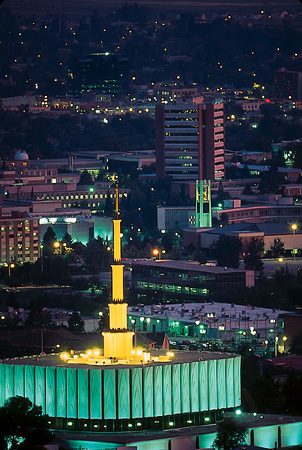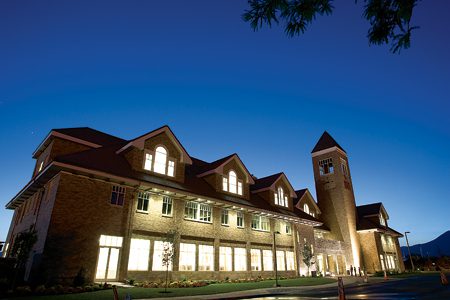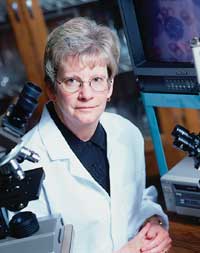
Students at BYU have the opportunity and responsibility to “seek learning, even by study and also by faith” (D&C 88:118) as they become both desciples and scholars
By Kristine Hansen, ‘73
A complete education enlarges the spirit and the mind.
In a 1967 address President of the Church of Jesus Christ Spencer W. Kimball said BYU should provide “education for eternity.” The faculty here, he stated, have a double heritage and a double responsibility to preserve and teach not only the knowledge of men but “the revealed truths sent from heaven.”1
I want to speak about enlarging the intellect and strengthening the spirit, two aims of a BYU education. As far as I can tell, when these two activities are correctly understood, you can’t do one without the other. Some people speak of the intellect and the spirit as if they were diametrically opposed, warning that those who engage deeply in intellectual pursuits will lose their testimonies. However, sociologists who have studied members of the Church of Jesus Christ have concluded the opposite: higher levels of education are strongly correlated with indicators of faithfulness.2 This is not to say that one must have diplomas and degrees to be a stalwart member of the Church. But I propose that those who have attained a high degree of spirituality are also those whose minds are most alive to the wonders of creation and the noblest achievements of the human race. Intellectual and spiritual pursuits not only can but should be harmonized so that the most effective learning will take place, as well as learning that will contribute to our spiritual safety.
The Prophet Joseph Smith taught, “We consider that God has created man with a mind capable of instruction, and a faculty that may be enlarged in proportion to the heed and diligence given to the light communicated from heaven to the intellect; and that the nearer man approaches perfection, the clearer are his views, and the greater his enjoyments, till he has overcome the evils of his life and lost every desire for sin.”3 This statement suggests that the greater one grows in spiritual stature, the greater one will grow in intellectual ability as well. Brigham Young described the scope of our religion thus: “It matters not what the subject be, if it tends to improve the mind, exalt the feelings, and enlarge the capacity. The truth that is in all the arts and sciences forms a part of our religion.”4 These familiar verses from the Doctrine and Covenants sum up well the encompassing nature of what the Lord expects us to teach and learn:
Teach ye diligently and my grace shall attend you, that you may be instructed more perfectly in theory, in principle, in doctrine, in the laws of the gospel, in all things that pertain unto the kingdom of God, that are expedient for you to understand;
Of things both in heaven and in the earth, and under the earth; things which have been, things which are, things which must shortly come to pass; things which are at home, things which are abroad; the wars and the perplexities of the nations, and the judgments which are on the land; and a knowledge also of countries and of kingdoms. [D&C 88:78–79]
The gospel is a vast topic, and it can’t be learned casually. In addition to studying the gospel, this scripture implies we should study everything from astronomy to zoology—every field of learning that belongs to this earth.
We often stop quoting the verses from section 88 at this point, but the next verse explains why we should learn about so many things: “That ye may be prepared in all things when I [the Lord] shall send you again to magnify the calling whereunto I have called you, and the mission with which I have commissioned you” (D&C 88:80). This scripture states that the education we gain in the gospel and other fields is to prepare us for the callings the Lord will give us. The Lord and His Church need people who have both spiritual understanding and excellent educational preparation.
Thus, it is important to approach our studies with an inquiring and enthusiastic attitude. Occasionally, students will ask why so many courses are required in general education. Some have even seriously suggested that, if they already know what they want to major in, they shouldn’t be required to take general education classes. Allow me to let Albert Einstein and then Brigham Young respond to that argument. Einstein said,
It is not enough to teach man a speciality. Through it he may become a kind of useful machine, but not a harmoniously developed personality. It is essential that the student acquire an understanding of and a lively feeling for values. He must acquire a vivid sense of the beautiful and of the morally good. Otherwise he—with his specialized knowledge—more closely resembles a well-trained dog. . . . Premature specialization on the ground of immediate usefulness kills the spirit on which all cultural life depends, specialized knowledge included.5
Now Brigham Young: “Let us not narrow ourselves up; for the world, with all its variety of useful information and its rich hoard of hidden treasure, is before us; and eternity, with all its sparkling intelligence, lofty aspirations, and unspeakable glories, is before us, and ready to aid us in the scale of advancement and every useful improvement.”6 Can we imagine that Jesus, the Creator of this earth and everything in it, lacked any kind of knowledge as He prepared to fulfill the assignment His Father gave Him to “go down” and “make an earth whereon [His spirit children] might dwell” (Abr. 3:24)
Students should approach their studies with the attitude demonstrated 20-some years ago by a young man on this campus who was chosen to be a Rhodes Scholar. In an interview for the campus newspaper he said that as he approached the library to study he felt much the same way as when he approached church on Sundays to attend his meetings. Both study and worship were for him a time of spiritual edification.
He was an example of what Elder Neal A. Maxwell of the Quorum of the Twelve Apostles has called the “disciple-scholar.” “For a disciple of Jesus Christ,” Elder Maxwell says, “academic scholarship is a form of worship. It is actually another dimension of consecration. Hence one who seeks to be a disciple-scholar will take both scholarship and discipleship seriously; and, likewise, gospel covenants. For the disciple-scholar, the first and second great commandments frame and prioritize life. How else could one worship God with all of one’s heart, might, mind, and strength? (Luke 10:27)”7 Elder Maxwell continues, saying, “Consecrated scholarship thus converges both the life of the mind and of the spirit!”8
However, Elder Maxwell qualifies his urging that we worship God with our minds through scholarship. The first qualification is that “there is no democracy among truths.”9 Not all truths are of equal significance. The revealed truths of the gospel are more important and do take precedence over the truths that have been forged out of the collective efforts of human beings. It is good to know both, but if we must on occasion choose where to put our allegiance, we should choose revealed truths. The second qualification Elder Maxwell offers is this: “Genius without meekness is not enough to qualify for discipleship.”10 The disciple-scholar blends intellectual traits with spiritual ones that often seem their opposite. Such a person tempers curiosity with obedience; questioning with submissiveness; zeal for knowledge with faith and humility; and striving to excel with brotherly kindness. Perhaps this is part of what is meant by the encouragement to “seek learning, even by study and also by faith” (D&C 88:118).
This principle that faith contributes to learning is reinforced in Doctrine and Covenants 130:19: “If a person gains more knowledge and intelligence in this life through his diligence and obedience than another, he will have so much the advantage in the world to come.” Notice that two ways we gain knowledge and intelligence are diligence and obedience. Some things we cannot learn through intellectual efforts alone. How can we know that the windows of heaven will open for us unless we tithe? How can we know the blessings of Sabbath observance unless we keep the Sabbath holy? Let us remember the counsel of Nephi: “To be learned is good if [we] hearken unto the counsels of God” (2 Ne. 9:29). Such hearkening will increase our knowledge and enlarge our intellectual aptitude.
Finally, let us follow the counsel given by our beloved prophet, Gordon B. Hinckley, when he was a member of the Quorum of the Twelve Apostles nearly 40 years ago. Speaking of the Savior’s invitation to “learn of me” (D&C 19:23), Elder Hinckley said, “With all of your learning, learn of him. With all of your study, seek knowledge of the Master. That knowledge will complement in a wonderful way the secular training you receive and give a fulness to your life and character that can come in no other way.”11
notes
1. Spencer W. Kimball, “Education for Eternity,” in Educating Zion, ed. Jack W. Welch and Don E. Norton (Provo, Utah: BYU Studies, 1996), p. 43.
2. Stan L. Albrecht and Tim B. Heaton, “Secularization, Higher Education, and Religiosity,” in Review of Religious Research, vol. 26, no. 1 (Sept. 1984), pp. 43–59.
3. Joseph Smith, Teachings of the Prophet Joseph Smith, sel. and arr. Joseph Fielding Smith (Salt Lake City: Deseret News Press, 1938), p. 51.
4. Brigham Young, in Journal of Discourses, vol. 1 (London: Latter-day Saints’ Book Depot, 1854–86), p. 335.
5. Albert Einstein, letter to the editor, New York Times, Oct. 5, 1952.
6. Brigham Young, Discourses of Brigham Young, sel. John A. Widtsoe (Salt Lake City: Deseret Book, 1954), p. 279.
7. Neal A. Maxwell, “The Disciple-Scholar,” in On Becoming a Disciple-Scholar, ed. Henry B. Eyring (Salt Lake City: Bookcraft, 1995), p. 7; emphasis in original.
8. Ibid., p. 8.
9. Ibid., p. 3.
10. Ibid., p. 14.
11. Gordon B. Hinckley, in Conference Report, Oct. 1964, p. 118.
Kristine Hansen is the associate dean of general education and honors. This article is adapted from “Lift Thine Eyes to the Mountains,” a devotional address given July 3, 2001.
web: The full text of this address can be accessed at speeches.byu.edu.









